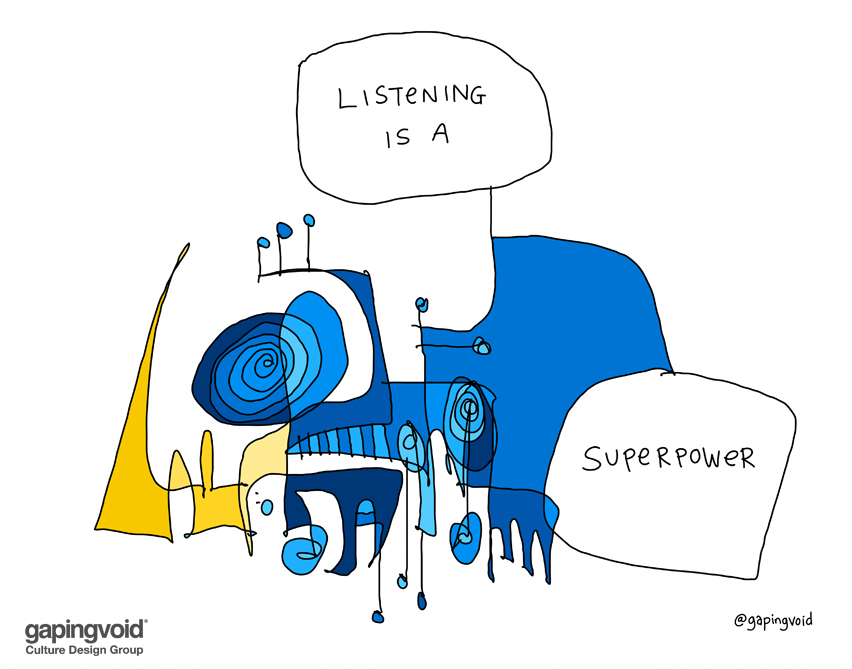If You Want to Innovate, Listen!

If you're interested in raising the bar for innovation in your organization, start listening more. Listening, quite simply, is the most powerful form of influence.
Generally speaking, when we think of influencing others we are thinking about our ability to get others to think and act in ways we want them to, in ways that serve our interests and objectives.
The influence process is most often conceived as the ability to provide compelling arguments -- that is, arguments that are indisputable and indicate there is only one way to proceed.
The influence process is seen as the ability to turn aside all alternative ways of thinking, to demonstrate their inadequacy in the service of making one's own position more compelling.
The ability to influence goes beyond the ability to make a compelling argument, of course. It can also involve the use of power, seduction, or fear to drive others to a particular outcome.
What is much more rarely recognized is the role of listening and empathy in the influence process.
Listening to what concerns and drives others provides a powerful basis for influence because it is by showing how your perspective will affect the concerns and interests of others that you gain others' interest and support.
But the case for listening and empathy goes much further.
If you can truly understand what others value and are concerned about, it can lead you to change your position about what is required to achieve the goals you are striving for.
If you deeply understand others, you can mobilize them, not by manipulation -- but by gearing your approach to address the real needs and interests of your stakeholders.
Listening and appreciating multiple viewpoints can help you gain more acceptance for your ideas and better ideas. And, as it all plays out, these better ideas will eventually attract more support and increase your influence -- so you can then listen more and attract more support.
-- Barry Gruenberg
Illustration: gapingvoid.com
Idea Champions
MitchDitkoff.com
Comments
An even deeper layer of the power of listening is that it creates a space, or container, for the other person's truth to be captured. The deeper and more attentive the listening, the deeper the truth. It's as if the listening "pulls out" the truth. The power of this level of listening hasn't even begun to be considered, for the most part, but I believe that it is one of the least used, and understood, "super-powers" that humans possess.
Posted by: Val Vadeboncoeur ![[TypeKey Profile Page]](https://www.ideachampions.com/weblogs/nav-commenters.gif) at May 4, 2010 10:55 AM
at May 4, 2010 10:55 AM
Fine posting. Here are some more inputs on the topic:
Posted by: Frankcalberg ![[TypeKey Profile Page]](https://www.ideachampions.com/weblogs/nav-commenters.gif) at May 4, 2010 12:01 PM
at May 4, 2010 12:01 PM
The essence of this article provides the key to unlocking a collaborative relationship. True listening comes devoid of definitions, perceptions, or an agenda. It has the power to "educe," to bring out or draw out that which has not yet been revealed. When listening is not present, we usually resort to inducing, deducing, reducing, or seducing people into taking the actions we want them to take. When we practice the art of "not knowing" and fully listen, we empower people to make responsible choices rather than manipulate them to make rash decisions.
Posted by: Paul Roth ![[TypeKey Profile Page]](https://www.ideachampions.com/weblogs/nav-commenters.gif) at May 4, 2010 12:41 PM
at May 4, 2010 12:41 PM
Sometimes all you need to do as a leader is listen. It must be active listening, which means you nod and use body language to show that you are following what people are saying. Male leaders tend to interrupt and try to tell the person talking to them how to fix the situation. Fight the Mr. Fixit approach. Just listen. If someone is complaining about something, ask them what they would recommend. For more help check out the book summaries and hot tweets at DrDougGreen.Com.
Posted by: Dgreen ![[TypeKey Profile Page]](https://www.ideachampions.com/weblogs/nav-commenters.gif) at January 28, 2011 09:08 PM
at January 28, 2011 09:08 PM
Post a comment
Thanks for signing in, . Now you can comment. (sign out)
(If you haven't left a comment here before, you may need to be approved by the site owner before your comment will appear. Until then, it won't appear on the entry. Thanks for waiting.)














